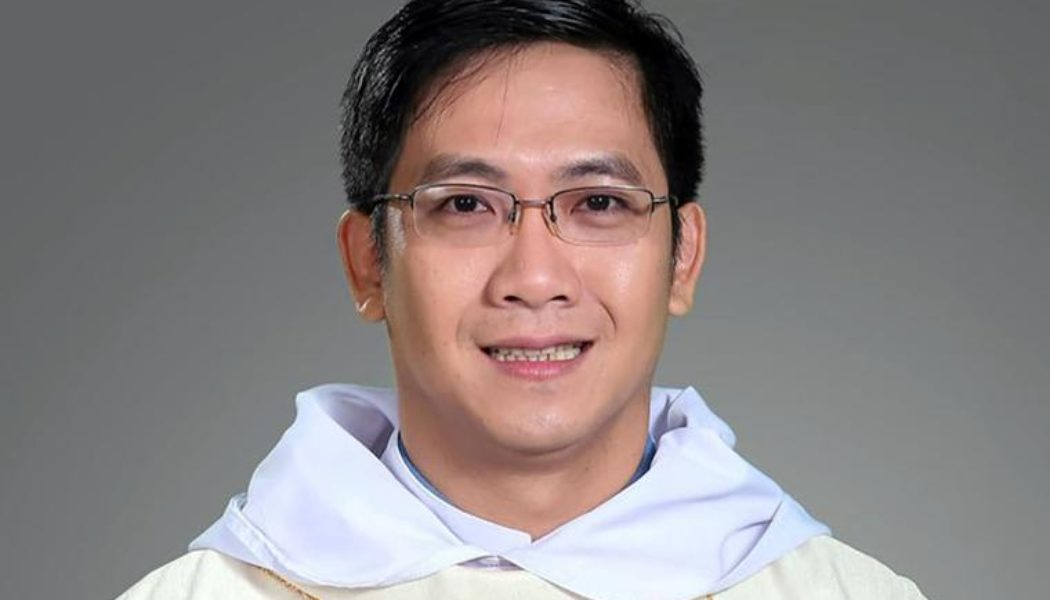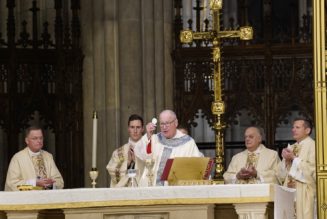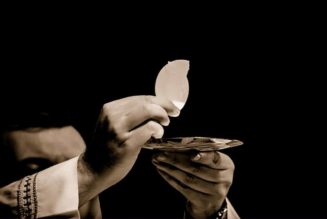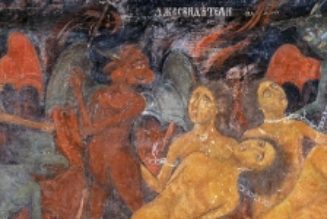
On Jan. 30, after finishing celebrating Sunday morning Masses, I was startled by a text message from a friend, a cloistered Dominican nun, with news that one of her spiritual brothers in the Order of Preachers had been murdered hearing confessions the previous night in Vietnam.
Father Giuse Tran Ngoc Thanh, 40, ordained in 2018, had just celebrated a 6pm vigil Mass in Sa Loong Parish in Dak Mot, a missionary part of the Diocese of Kon Tum, where he was recently put in charge. The Mass was for the Fourth Sunday of Ordinary Time, in which the Church ponders how Jesus’ fellow Nazarenes, after having heard him preach, passed quickly from amazement to doubt to trying to murder him. We also hear about the sufferings of the prophet Jeremiah and listen to St. Paul’s famous canticle describing how love is patient, kind and enduring.
Father Giuse, after having preached on those readings, would soon proclaim in body language the prophetic dimension of those words.
Right after Mass was done, Father Giuse went to hear confessions in the plastic chair of the makeshift confessional at the end of the Mission chapel. At 7:15, Nguyen Van Kien, a young, nonpracticing Catholic whose mother was at the Mass, rushed with a machete and struck Father Giuse twice in the head. He collapsed in blood, the children and adults in the Church all screamed, and a Dominican student brother and choir director, Brother Anthony Phan Van Giao, ran to try to defend the priest.
When Kien raised the machete to slash Brother Anthony’s head, the choir director raised a plastic chair to defend himself, but it proved no defense, being split in half. Kien started to chase Brother Anthony with the machete into the middle of the chapel, but when the young Dominican saw the many children present and grasped the possibility that they could be massacred, he courageously turned toward Kien, who sought to gash him again. The tiny brother was able to divert the killer’s arm, get behind him and put him in a chokehold, as fellow parishioners rushed in.
Brother Anthony begged the parishioners not to pummel Kien in retaliation but to restrain him and call the police. He went to care for Father Giuse and got a member of the parish to rush him to the hospital in Ngoc Hoi about eight miles away. After bleeding for about five hours, Father Giuse died at 11:30 that night. Before he breathed his last, he forgave his murderer. He was buried the following day. His grave has since become a place of pilgrimage for Christians and others queuing in line to pray, lay flowers and pay their respects.
There’s confusion about what would have led Nguyen Van Kien to attack Father Giuse in the confessional. Some have described him as mentally ill, but the Bishop of the Kon Tum Diocese who celebrated his funeral repeated Kien’s parents’ assessment that he was not “insane in the usual sense,” but rather “lethargic and does not practice the faith.” Several said he was a drug abuser.
While he has a sister who is in a discernment house pursuing a possible religious vocation, he likewise has a younger brother who served three years in prison for manslaughter. His parents stated that while he had made money working on farms and repairing motorcycles, he would also “get angry, mess around, loudly curse people, smash television sets, even the shrine in his house, and beat his family members.” He was also “paranoid,” they added, about being bullied and about potentially not being able to find a wife. The Vietnamese Dominicans, who have said that they also forgive him, want a trial at least so that the motivation for the killing comes to the light.
Many have immediately begun to call Father Giuse a martyr of the confessional. While there have been several priests who have been martyred for protecting the seal of the sacrament of confession — St. John Nepomuk (d. 1393), St. Mateo Correa (d. 1927), Blessed Felipe Císcar Puig (d. 1936) and Blessed Fernando Olmedo (d. 1936) — I am unaware of any priest who was slain while hearing confessions. Until now.
While there is always, from a human dimension, a natural revulsion to the killing of the innocent, and the death of this young missionary priest and religious, son and brother, must be sincerely and viscerally lamented, there is also from a sacramental view something quite glorious about his death.
The sacrament of penance and reconciliation is all about death and resurrection. Jesus Christ was brutally murdered — flesh ripped apart by Roman soldiers, hammered by his limbs to wood, mocked and crowned with thorns — but through that death and subsequent resurrection he took away the sins of the world.
The confessional is the place where, to use Jesus’ words in the Parable of the Prodigal Son, the “dead … come to life again” (Luke 15:24). For a priest ordained in the person of Christ, instructed at his ordination to model his life on the mystery of the Lord’s cross, there is this logic of death and resurrection built into the celebration of all the sacraments, but it’s particularly pronounced in the sacrament of confession. Its regular practice involves a form of martyrdom.
There is, often, a martyrdom of waiting. St. John Vianney, the patron saint of parish priests and the most famous and heroic confessor in the history of the Church, had to wait in the confessional for almost a decade before his parishioners started to avail themselves of the gift of God’s mercy. He did wait, however, as a profound testimony to the importance of the sacrament.
After 10 years of patient prayer and preaching, his parishioners — and multitudes from throughout post-revolutionary 19th-century France — came without stop. Many priests still experience this martyrdom of waiting, which is a real death to spiritual worldliness, as they tenaciously serve as ambassadorial advertisements crying out, “Be reconciled to God” (2 Corinthians 5:20).
But when people grasp the importance of the sacrament, there can be another form of martyrdom, which we can call the “martyrdom of the crowds,” when so many people come that one is “trapped” for hours within. This happened in Ars, where, for the last 30 years of his life, St. John Vianney needed to hear confessions for 12-18 hours a day. He referred to his confessional as the cross to which he was nailed throughout the day as he sought to dispense the redemptive power of Christ’s blood, one person at a time, to those for whom Christ died. He also referred to the wooden box of the confessional as his “coffin,” where he died to himself so that the merciful Redeemer could live.
There’s something like this that takes place when a priest has the happy burden of confessing long lines. In the midst of the great joy of heaven and the often profound human joy of forgiven penitents, there’s also a form of self-death involved, as the priest resigns himself to what it takes interiorly to remain basically immobile and give full attention to each person for hours. He battles fatigue and sometimes repetitiveness, tenderly weeps with those who weep, and occasionally struggling with penitents who need extra loving firmness to extricate themselves from some near occasions of sin. While many can appreciate such a priest’s priorities, commitment and stamina, few can grasp how it’s the experience of the grain of wheat (John 12:24).
But the most pronounced aspect of the martyrdom of the confessional is the sacramental seal of confession, which prevents a priest from revealing the contents of what he hears, even should he be threatened with imprisonment, torture or death. Sometimes the martyrdom is relatively routine, when the details of what a priest has heard linger in his mind and soul, like the details of violent crimes that have been confessed, or when he recognizes too late that he should have given different advice. Other times the martyrdom is more pronounced, like when a priest is accused of saying or doing something in the confessional he didn’t, but can’t say a syllable in self-defense. Other times it is extraordinary, when priests are murdered for protecting the seal, like we see in the lives of the saints I mentioned above.
At a time when some countries and states are trying to require priests to break the sacramental seal in particular cases — something priests not only cannot do under canon law but simply won’t do — this aspect of martyrdom will likely be witnessed more frequently in upcoming years, as priests are involuntarily assigned by the state to ministry in prison.
On Jan. 29, little did Father Giuse know what awaited him after Mass as he donned a purple stole and sat down to hear confessions. But the normal practice of the martyrdom of the confessional doubtless prepared him for what the Lord knew was coming.
And his martyrdom to the sacrament of Christ’s mercy is a poignant reminder to his fellow confessors, and indeed to all the faithful, of the importance of the sacrament, the worthy sacrifice it entails and the life it imparts.
Join Our Telegram Group : Salvation & Prosperity









